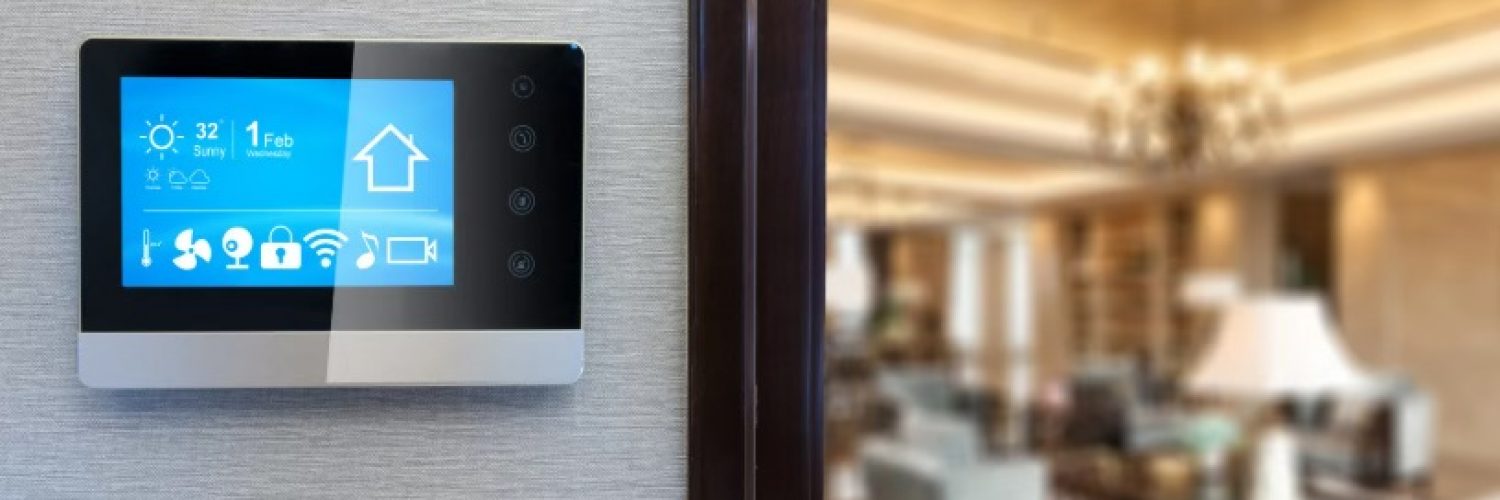In today’s connected world, Smart technology integration for modern pool and patio spaces has transformed how homeowners experience their outdoor environments. No longer are pools and patios simply static features of a landscape. They’ve become dynamic, responsive extensions of the home that can be controlled with the touch of a button or a simple voice command.
As we move through 2025, the integration of smart technology into outdoor living spaces has become increasingly sophisticated, offering unprecedented levels of convenience, efficiency, and enjoyment. This comprehensive guide explores how these innovations are reshaping outdoor living and how you can implement them in your own backyard sanctuary.
Understanding Smart Outdoor Technology Ecosystems
The foundation of any smart pool and patio space begins with understanding the ecosystem of technologies that work together to create a seamless experience. Modern smart outdoor systems no longer function as isolated components but rather as interconnected networks that communicate with each other and with your home’s existing smart infrastructure.
Core Components of Smart Pool Systems
Smart pool technology has evolved dramatically in recent years, moving far beyond basic automation. Today’s systems incorporate multiple elements that work in harmony to enhance the pool experience while reducing maintenance requirements.
At the heart of most smart pool systems is a central control hub that manages various functions including:
- Water chemistry monitoring and automatic adjustment
- Temperature regulation and heating efficiency
- Filtration and cleaning cycles
- Lighting control and programming
- Water feature operation (fountains, waterfalls, etc.)
These systems can monitor water quality in real-time, alerting you to imbalances before they become problems. Advanced sensors can detect everything from pH levels to sanitizer concentration, automatically dispensing chemicals as needed to maintain optimal water conditions. This not only ensures a healthier swimming environment but also extends the life of your pool equipment and surfaces.
According to a 2024 report by Pool & Spa News, homes with smart pool systems report 60% fewer chemical-related issues and achieve up to 40% greater energy efficiency compared to traditional pool setups. This technology integration represents a significant advancement in hardscaping 101practices, demonstrating why proper infrastructure is vital for modern outdoor spaces.
Essential Smart Technology for Modern Patios
The patio area serves as the central hub for outdoor living and entertainment, making it the perfect candidate for smart technology integration. Modern patio spaces can incorporate:
Smart lighting systems that adjust based on time of day, occupancy, or specific programmed scenes. These can be synchronized with music or entertainment systems for immersive experiences.
Climate control features such as smart fans, misting systems, and infrared heaters that respond to temperature changes and occupancy, extending the usability of your outdoor space throughout the year.
Automated shade solutions that adjust based on sun position and temperature readings, providing comfort while protecting furniture and flooring from UV damage.
Smart outdoor kitchens with connected appliances, temperature-controlled storage, and cooking surfaces that can be preheated remotely before you arrive home.
As landscape design experts in Charlotte, NChave observed, integrating these technologies during the initial design phase yields the most seamless results, though many can be retrofitted into existing spaces with proper planning.
Seamless Integration Between Pool and Patio Spaces
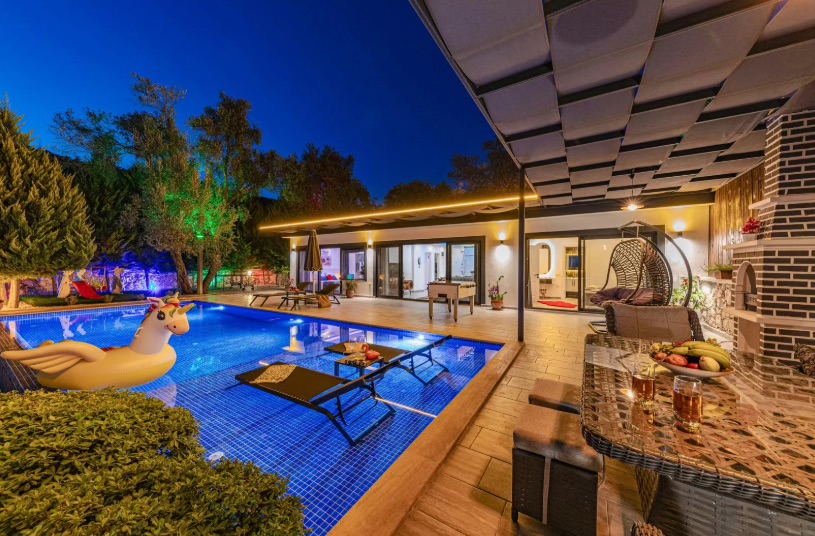
The true power of smart outdoor technology emerges when pool and patio systems work in concert, creating a unified experience across your entire outdoor living area.
Creating Unified Control Systems
One of the most significant advancements in outdoor smart technology is the ability to control diverse systems through a single interface. Modern integration platforms allow homeowners to manage pool functions, patio lighting, audio systems, climate control, and even landscape irrigation from one app or control panel.
This unified approach eliminates the frustration of juggling multiple apps and remote controls. Leading platforms like Control4, Crestron, and Savant offer comprehensive outdoor integration capabilities that can be customized to your specific needs and preferences.
The most successful smart outdoor spaces don’t just connect devices. They create experiences that flow naturally from one area to another, responding intuitively to how people actually use their outdoor environments.
The key to successful integration lies in thoughtful planning and professional implementation. Working with expert landscape contractors in Charlotte, NCwho understand both the technological and aesthetic aspects of outdoor space design ensures that systems work together seamlessly while complementing your landscape’s visual appeal.
Synchronized Lighting and Ambiance
Perhaps the most visually striking aspect of smart integration is the ability to create synchronized lighting scenes across pool and patio areas. Modern LED lighting systems can be programmed to transition through color schemes, respond to music, or mark special occasions with themed displays.
Smart lighting can define different zones within your outdoor space, highlight architectural features, and improve safety by automatically illuminating pathways and steps. When integrated with motion sensors, these systems can also serve as a security feature, activating when unexpected movement is detected.
For homeowners in Charlotte looking to enhance their outdoor spaces, fire pit installationscan be integrated with smart technology to allow remote ignition, temperature control, and synchronized lighting effects that complement the natural glow of the flames.
Enhancing Efficiency Through Smart Technology
Beyond convenience and aesthetics, smart technology delivers significant efficiency benefits that can reduce operating costs and environmental impact.
Energy-Saving Automation Features
Smart pool systems can reduce energy consumption by 30-70% compared to traditional setups through intelligent pump management, optimized heating cycles, and automatic covers that retain heat and reduce evaporation. These systems learn from usage patterns to predict when heating should begin and can adjust operations based on weather forecasts.
Similarly, smart patio features like automated awnings, efficient LED lighting, and zone-based climate control ensure that energy is used only when and where it’s needed. Integrated occupancy sensors can automatically adjust or shut down systems when areas are unoccupied, eliminating wasted energy.
Investing in landscaping upgradesthat incorporate smart technology has been shown to deliver an average ROI of 150% according to the National Association of Realtors’ 2024 Remodeling Impact Report, making it one of the most valuable home improvements available.
Water Conservation Technologies
Water management represents another critical efficiency frontier in smart outdoor systems. Advanced pool controllers can significantly reduce water waste through:
Precise monitoring of water levels with automatic filling only when necessary Leak detection systems that alert homeowners to potential problems Backwash optimization that minimizes water used during filter cleaning Evaporation reduction through automated cover deployment
For surrounding landscape areas, smart irrigation systems can integrate with pool and patio controls, using weather data and soil moisture readings to water plants only when needed. These systems can even adjust watering schedules based on recent pool splash-out or rainfall measurements.
Remote Monitoring and Control Capabilities
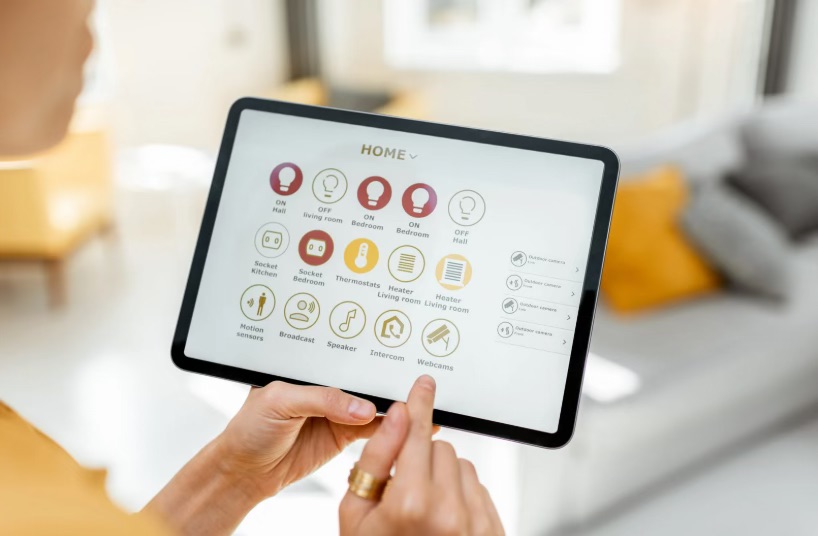
The ability to monitor and control outdoor systems from anywhere represents one of the most appreciated aspects of smart technology integration.
Mobile App Integration
Comprehensive mobile apps now serve as command centers for entire outdoor environments. These interfaces have evolved from basic control panels to intuitive dashboards that provide detailed information about system status, usage history, and maintenance needs.
Modern apps offer features such as:
Real-time water chemistry readings and adjustment recommendations Energy consumption tracking and efficiency reports Maintenance scheduling and automated service reminders Customizable scenes that activate multiple systems with a single command Historical data analysis to optimize system performance
For homeowners who work with Charlotte landscaping services, these apps can often be configured to share specific data with maintenance professionals, allowing for proactive service and troubleshooting without requiring in-person visits.
Voice Command Systems for Outdoor Spaces
Voice control has extended beyond the home’s interior to become a natural interface for outdoor environments. Weather-resistant microphone arrays and strategically placed speakers allow systems to respond to commands throughout the pool and patio area.
Integration with platforms like Amazon Alexa, Google Assistant, and Apple HomeKit enables natural language control of virtually any connected feature. Imagine saying “It’s movie night” and watching as the pool lights dim, the patio heaters activate, the projector screen descends, and the audio system adjusts to optimal levels, all without touching a single control.
Weatherproof voice assistants designed specifically for outdoor use have emerged from companies like Sonos and Bose, offering robust performance even in challenging conditions. These systems can be integrated with outdoor fireplace installationsto create truly immersive entertainment zones.
Weather-Responsive Smart Features
One of the most impressive capabilities of integrated outdoor technology is its ability to respond intelligently to changing weather conditions.
Automated Adjustments Based on Environmental Conditions
Advanced weather-responsive systems use data from local weather services, on-site weather stations, and environmental sensors to make automatic adjustments that protect your investment and enhance comfort:
Pool covers that deploy automatically when storms approach Patio awnings that retract in high winds to prevent damage Heating systems that activate when temperature drops below set thresholds Irrigation schedules that adjust based on rainfall predictions Pool chemistry systems that compensate for heavy sun exposure or rainfall
These proactive responses not only protect your outdoor investments but also ensure that your space is always ready to enjoy when conditions are favorable. For homeowners in areas with variable weather patterns, this capability is particularly valuable.
Working with landscape architects in Charlotte, NCwho understand local climate patterns ensures that weather-responsive features are calibrated appropriately for regional conditions.
Smart Entertainment Solutions for Outdoor Living
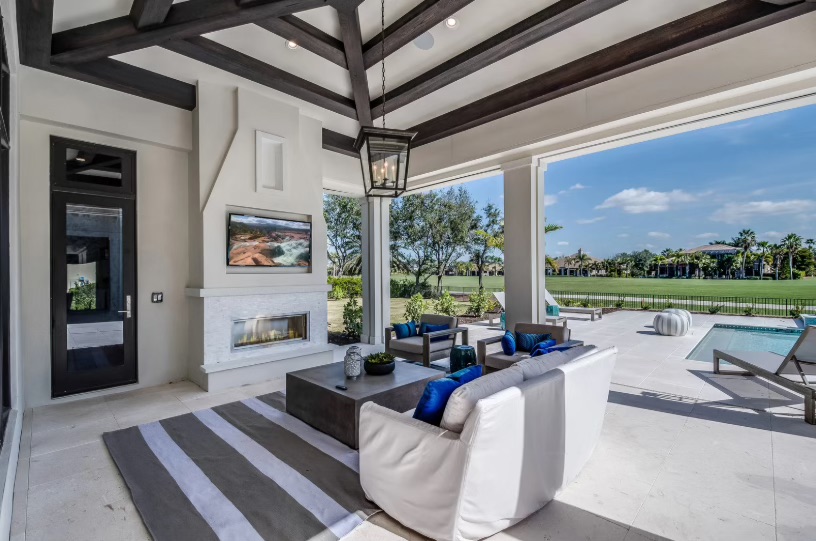
Entertainment technology has become increasingly sophisticated and weatherproof, allowing for truly immersive outdoor experiences.
Audio-Visual Integration for Pool and Patio Areas
Today’s outdoor entertainment options extend far beyond basic weatherproof speakers. Full audio-visual integration can include:
Multi-zone audio systems with underwater pool speakers Weatherproof televisions and projector screens Landscape speakers disguised as rocks or integrated into plantings Synchronized lighting that responds to music or movie content Streaming service integration for seamless content access
These systems can be designed to provide balanced sound throughout the space while minimizing noise pollution for neighbors. Advanced acoustic modeling software allows designers to optimize speaker placement for specific outdoor layouts.
For the ultimate entertainment experience, some homeowners are installing “dive-in movie” setups with waterproof projectors and floating screens for pool viewing, creating memorable experiences for family and guests that blend smart technology with traditional landscaping elements.
Security and Privacy Considerations
As outdoor spaces become more connected, addressing security and privacy concerns becomes increasingly important.
Protecting Your Smart Outdoor Systems
Smart pool and patio systems require thoughtful security measures to protect both the technology itself and the data it generates. Key considerations include:
Segregated networks that isolate outdoor systems from main home networks Regular firmware updates to address security vulnerabilities Strong encryption for all wireless communications Multi-factor authentication for system access Local control options that function without internet connectivity
Privacy concerns should also be addressed, particularly for systems that include cameras or collect usage data. Reputable installation professionals will provide clear information about what data is collected, how it’s stored, and who has access to it.
Working with experienced landscape contractorswho understand both the technological and security aspects of smart outdoor systems ensures that your installation is both convenient and secure.
Installation and Maintenance Best Practices
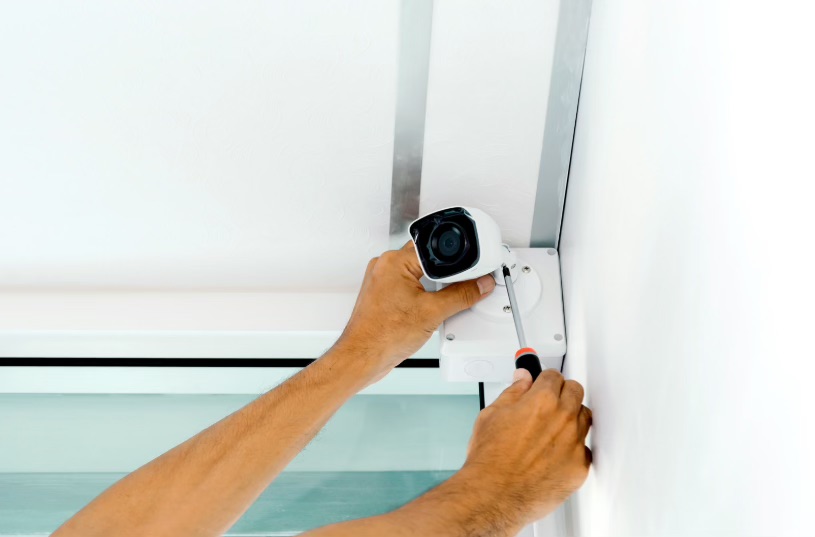
Proper installation and ongoing maintenance are critical to the long-term success of smart outdoor technology integration.
Professional vs DIY Implementation
While some smart outdoor technologies can be installed by homeowners, comprehensive integration typically requires professional expertise. Considerations when choosing between DIY and professional installation include:
Complexity of electrical and plumbing requirements Need for specialized programming and system configuration Integration with existing home automation systems Weatherproofing and durability requirements Warranty implications of professional vs. self-installation
For most homeowners, a hybrid approach works best: professional installation of core infrastructure with the flexibility to add and configure certain components themselves. This approach provides a solid foundation while allowing for personalization and future expansion.
Maintenance requirements for smart systems are generally lower than their traditional counterparts, but regular professional check-ups are still recommended. Many Charlotte outdoor contractorsnow offer maintenance plans specifically for smart outdoor systems, ensuring optimal performance year-round.
Your Smart Outdoor Living Journey Starts Today
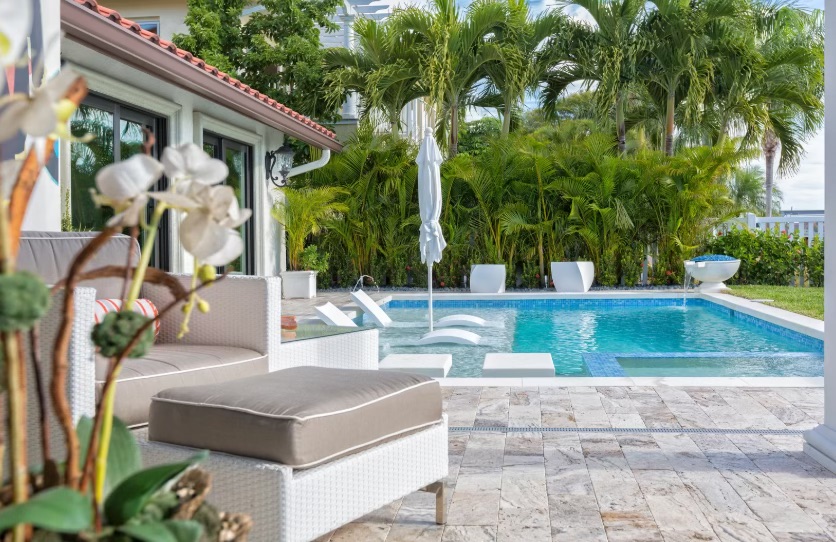
The integration of smart technology into pool and patio spaces represents one of the most exciting developments in outdoor living. From enhanced efficiency and convenience to new entertainment possibilities and increased property value, these innovations offer compelling benefits for homeowners.
As you consider smart technology for your own outdoor space, remember that successful integration begins with thoughtful planning and professional guidance. Our team at JH Landscapesbrings extensive experience in designing and implementing smart outdoor systems that enhance both the functionality and aesthetic appeal of your property.
Whether you’re building a new outdoor living area or upgrading an existing space, smart technology integration can transform your experience and increase your enjoyment for years to come. Contact JH Landscapes todayat (704) 999-0976to schedule a consultation and discover how smart technology can elevate your pool and patio spaces to new levels of luxury and convenience.
Frequently Asked Questions
What is the typical cost range for integrating smart technology into existing pool and patio spaces?
The cost of smart technology integration varies widely based on the scope and complexity of the project. Basic smart pool controllers start around $1,500-$2,500 installed, while comprehensive systems integrating pool, lighting, audio, and climate control typically range from $8,000-$25,000. For new construction, incorporating smart technology from the beginning is more cost-effective than retrofitting.
According to industry data from 2024, homeowners typically recoup 70-85% of smart technology investments in increased property value, with additional returns through reduced operating costs. For budget-conscious homeowners, understanding cost-effective hardscaping optionscan help balance technology investments with other landscape elements.
How difficult is it to integrate smart pool and patio technology with existing home automation systems?
Integration complexity depends primarily on the compatibility of your existing systems. Modern platforms like Control4, Crestron, Savant, and mainstream consumer systems (Apple HomeKit, Google Home, Amazon Alexa) generally offer good interoperability with outdoor technologies. The most seamless integration occurs when working with professionals who are certified in both your home’s automation platform and outdoor systems.
In some cases, bridge devices or middleware may be required to connect disparate systems. Most integration challenges can be overcome with proper planning and expertise, though older proprietary systems may present more limitations.
What maintenance requirements should I expect with smart pool and patio technology?
Smart systems generally require less day-to-day maintenance than traditional setups but do need periodic professional attention. Typical maintenance includes quarterly software updates, annual sensor calibration, and occasional replacement of consumable components like chemical probes (every 1-2 years).
Many systems offer remote diagnostic capabilities, allowing technicians to troubleshoot issues without an on-site visit. The most reliable installations include redundant components for critical functions and battery backups to maintain operation during power outages. Establishing a maintenance relationship with your installation provider ensures optimal performance and system longevity.
Can smart outdoor technology really improve energy efficiency, and by how much?
Yes, smart technology significantly improves energy efficiency through optimized operation and reduced waste. Independent studies show smart pool systems reduce energy consumption by 40-60% compared to traditional equipment through variable-speed pump management, intelligent heating cycles, and automated covers that reduce heat loss.
Smart lighting systems typically achieve 70-80% energy savings through LED technology, occupancy sensing, and scheduled operation. Climate control features like automated shades and zone-based heating can reduce energy use by 30-50%. The combined effect of these technologies can reduce the overall operating cost of outdoor spaces by 30-70%, with most homeowners reporting complete return on investment within 2-4 years through utility savings alone.
What security measures should I implement to protect my smart outdoor systems from hacking?
Securing smart outdoor technology requires a multi-layered approach. Essential measures include creating a separate network (VLAN) for outdoor systems, implementing strong password policies with regular changes, enabling two-factor authentication where available, and keeping all firmware and software updated. Physical security is equally important. Control panels and network equipment should be installed in locked, weatherproof enclosures.
Work with smart home installation professionals who follow security best practices and can document their security protocols. Regular security audits by qualified professionals can identify and address vulnerabilities before they can be exploited. Remember that convenience and security must be balanced. The most secure systems incorporate both technological protections and thoughtful usage policies.
About JH Landscapes
JH Landscapes is a premier landscape design and installation company serving Charlotte, North Carolina and surrounding communities. With over 15 years of experience transforming outdoor spaces, our team specializes in creating seamless integrations of traditional landscaping with cutting-edge smart technology. We pride ourselves on delivering exceptional craftsmanship, innovative designs, and responsive service that exceeds client expectations. From concept to completion, JH Landscapes partners with homeowners to create outdoor environments that enhance both property value and quality of life.

